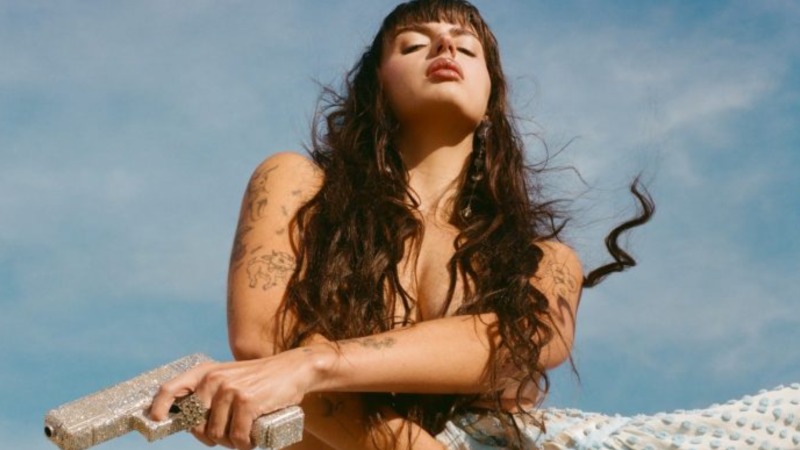Rebecca Black Looks For SALVATION But Only Finds Failure
The singer’s sophomore album is generic, out of vogue and woefully misguided, rinsing contemporary pop music’s strongest laurels with half-hearted, half-baked gestures of drum’n’bass and hyperpop.

I was reading DIY’s recent review of Rebecca Black’s new album, SALVATION, and I had to pause, shut my laptop, do a lap around my house and then come back and double-check that what I’d read was actually on the screen. But there it was, a great fear plastered on a webpage, a writer making the worst comparison of 2025: “It’s hard to imagine anything more massive than…the moment of commerciality on ‘Twist the Knife,’ which amalgamates something like the contemporary disco of Kylie Minogue with a spooky Kim Petras.” Sorry, DIY, I was unfamiliar with your game, unfamiliar with how audacious you were willing to go, unfamiliar with your reckless abandon.
The truth is, Rebecca Black is not Kylie Minogue. Now, I’m not here to predict whether or not Black will ever reach the same highs as any of Minogue’s albums—she certainly could make a Body Language or a Fever sometime later in her career, if she surrounds herself with the right collaborators—but I don’t think it’s too early to say the quiet part out loud: SALVATION is the first great pop failure in the wake of Charli xcx’s BRAT supremacy. The fun is over; the party is dying down and the only people left are the worst people you know. BRAT’s global takeover in 2024 was a net-positive, but records that create a superstar, build a season-long trend and penetrate the cultural walls of politics don’t simply have legacies immune to catastrophe, no matter the size.
SALVATION is a catastrophe, but SALVATION is not a BRAT imitation, let’s make that clear. It’s just a bad pop album that doesn’t have juice, or any semblance of an “it factor.” So much of this music pulls from the exciting new bastion of K-pop music coming out right now, like the work of Aespa or TWICE, yet it’s all so generic, out of vogue and woefully misguided, rinsing contemporary pop music’s strongest laurels with half-hearted, half-baked gestures of drum’n’bass and hyperpop. It’s sticky but far from sweet, as songs like “TRUST!” and “Do You Ever Think About Me?” could pass for any raggedy dance track spilling out of department store stereos. This is pop excess without any density; the kind of music that doesn’t bore you, because you were never paying attention to begin with.
SALVATION is big-budget and in-your-face, but its hugeness doesn’t quite fill up a room. Synths stack on top of each other, strums of guitar trickle in and out, drum programming throbbles and scuffles—but there’s never a real sense of cohesion, especially on “Sugar Water Cyanide,” which oscillates between a collage of tempos before settling into a mid-song mangling of pitch-shifted vocals. Black’s normal singing returns to center, but not for long, as the producers cut up her voice just slightly enough to keep it blurred. The glitching synths of “TRUST!” are especially white-bread; the production behind “Tears in My Pocket” is disorienting, as Black’s presence gets completely drowned out amid the noise of clashing, migraine-inducing electronica that zig through pockets of cringe.
I was 13 years old when “Friday” came out, the same age Rebecca Black was when she made the viral pop song, which reached 167 million views on YouTube in the three-ish months after coming out in March 2011. Black wrote it with co-producers Clarence Jey and Patrice Wilson, the two men responsible for Ark Music Factory, an LA production company that claimed to employ industry figures with clients like the Backstreet Boys and Miley Cyrus, only to disband barely two years after beginning and just a year after “Friday” memed Black into one of pop music’s most loathed figures. I remember this being a unique time in American culture, an era where I thought the greatest mark of comedy was Tosh.0, a show that, along with the rest of the internet, rebuked “Friday” into a hellish oblivion of negativity. In fact, “Friday” was once so dismissed in pop’s lexicon that it made songs like “Cups,” “Rude” and “Marvin Gaye” almost listenable. Emphasis on the “almost.” But the industry didn’t totally abandon the song, and artists like Katy Perry, Todd Rundgren, Odd Future and Justin Bieber were said to have covered it, as did Glee in its second season.
-

-

-

-

-

-

-

-

-

-

-

-

-

-

-

-

-

-

-

-

-

-

-

-

-

-

-

-

-

-

-

-

-

-

-

-

-

-

-

-








































